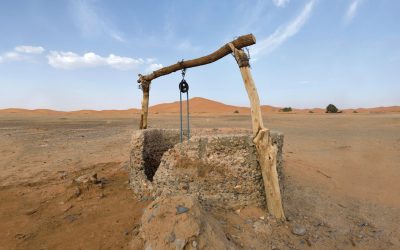Many developing countries have problems with poor sanitation and easy access to safe, clean water. But Madagascar is particularly badly served. In rural areas 87% of the population are exposed to debilitating, even life-threatening, waterborne diseases, including typhoid, bilharzia and cholera, especially during the rainy season when human and animal waste is washed into the water sources they regularly use.
Traditionally it is the task of women and girls to collect water for laundry, cooking and personal hygiene, often from far distant rice fields, rivers or ponds.
But this exhausting and time-consuming task, carried out several times each day, reduces the time women have available to look after their homes and families, and often prevents girls from going to school.
Collecting water also has a significant impact on families with babies or young children, whose water needs are considerable.
Most Malagasy are aware of the need to boil water before consumption.
But charcoal, the most commonly used fuel, is unaffordable to most; and collecting firewood is becoming more and more difficult, threatening the already fragile environment and contributing to deforestation and global warming.
This is where the Rotary Club of Amersham stepped in. When BBC Broadcaster John Humphrys came as a guest speaker to the club, he spoke of his work with the Madagascar Development Fund (MDF) – an organisation set up by former British embassy employees to carry out charitable work across Madagascar.
To date, the MDF has organised over 200 projects across the country including the installation of over 80 safe, clean water systems and after hearing John speak, the Rotary club decided that they had to get involved.
As a result, the Rotary Club of Amersham has teamed up with John Humphrys’ charity, the Kitchen Table Charities Trust, (KTCT) and the Rotary Club of Antananarivo Vovonana to carry out a similar project to help the populations of Ibisy and Moratsiazo in Madagascar’s Itasy District.
The area, which is found in the centre of Madagascar, is one of the smallest regions but one of the most densely populated, meaning resources are limited and often strained.
In February of this year, Rotarians will join forces with locals to build simple, gravity-fed, safe clean water systems.
Both systems will use water from reliable, natural springs located in the hills above their villages, and consist of covered concrete “capture tanks” – to collect and protect water directly from the spring heads.
From there the water will be piped to reservoirs and on to stand pipes located at strategic points around the villages, including Ahitantsoa and Moratsiazo primary schools, where for the first time more than 250 children will have water to drink and wash their hands with after visiting the latrine.
Experience has shown that easy access to safe, clean water allows more female children to go to school; reduces illness and the proportion of limited income spent on medicines and medical assistance; improves the general health of whole communities; increases productivity; and contributes to growing prosperity and better living conditions.
John Humphrys explains, “Safe, clean water is fundamental to good health, a basic human right and one of the Kitchen Table Charities Trust’s main focuses in countries throughout Africa and beyond.
“I am pleased and proud that KTCT had the opportunity to enter into partnership with the Rotary Clubs of Amersham and Antananarivo Vovonana to improve the harsh daily lives of the populations of Ibisy and Moratsiazo in Madagascar. I am convinced that together we can make a real difference.”
Brian Donaldson, Patron of the Madagascar Development Fund adds, “MDF has been seeking a source of finance for these major projects for more than two years. Without Rotary’s intervention both these communities would have faced many more years of life-threatening ill-health and deprivation.
“More than 2,200 villagers will benefit from this generous grant and the gift of clean water that will transform their lives forever. They and the Madagascar Development Fund greatly appreciate Rotary’s and KTCT’s support for these deprived and vulnerable communities.”


























































